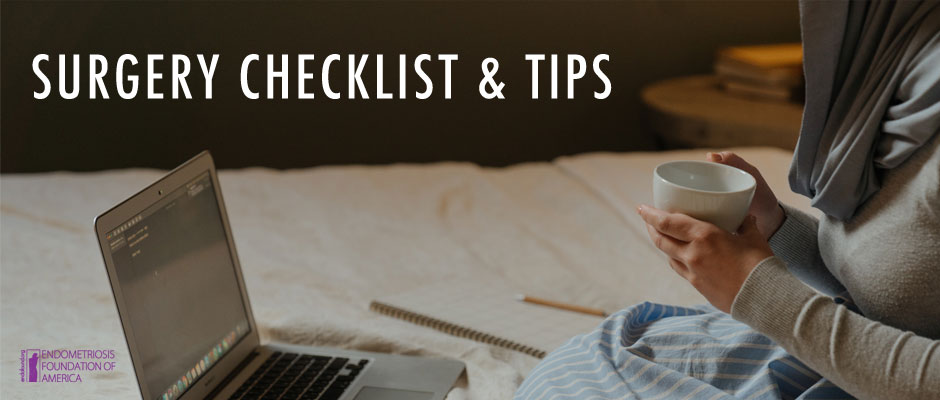
How to prep and pack for surgery
Every patient is different and every patient finds comfort through their own means. Based on popular and common surgery tips shared by endo patients, we recommend creating a list of groceries, items, etc. that will provide you comfort and eliminate stress as you prepare for surgery. We also advise a “post-surgery shopping list,” as you should not be going out to shop right after your surgery. Below is a list of items that has helped patients relieve some of their stress. Prep before surgery. Try not to overpack if you are traveling. You may mostly wear PJ’s, and as you may not want to wear anything with a tight waistband, bring skirts or dresses. Try to make sure someone comes with you, espeically if you're traveling for your surgery.
-
Heating pad, cold packs
-
Pads, panty liners
-
Lots of fluids (Gatorade, ginger ale, etc.), ginger tea, snacks in case you experience nausea
-
Light foods (soups, Jell-O, etc.)
-
Comfortable clothing, loose fitting clothing (sweatpants, comfortable bra, etc.)
-
Consider buying a larger size in your lower garments (pants, underwear)
-
Warm, clean blankets, and sheets
-
Entertainment: books, movies, magazines, headphones, etc.
-
Prepare and freeze meals in advance as you will not be cooking for some time
-
Phone or tape recorder to record conversations after the procedure and post op
-
A little pillow for car rides (don’t let the seat belt touch your tummy)
-
Clean the house as you don’t want to worry about this post-op, and prep the house for a comfy place to recover. Make sure there is an easy path to the restroom and avoid stairs
-
Sound machine, eye mask, or ear plugs, or anything you need to help you sleep
Remember, it is normal and healthy to feel a bit anxious, especially if this is your first surgery. Reach out to friends and family for love and support, as well as your endo friends and online support groups.
Post-Surgery
-
Over the counter medication: This can be helpful to reduce shoulder and back pain often caused by the gas used to fill the abdominal cavity following laparoscopic surgery. Discuss with your surgeon what medications could be right for you.
-
Stay hydrated and consider a mild stool softener: Following endometriosis surgery, especially in cases of bowel and rectal endometriosis, there can be delays in passing a bowel movement. Thus, it is crucial to stay hydrated and a mild stool softener could be worth discussing with your surgeon. Stay away from suppositories, laxatives, and enemas. Have water on hand at all times.
-
Comfortable place to rest: Make sure you can easily access the remote, pillows, and blankets. Pillows are a huge help in the car or plane, and if you have to cough or sneeze in the coming days.
-
Light diet: Give your bowels and body the rest and time they need to adjust post-surgery. It is a good idea to eat light for your first few days post-surgery. Smoothies, protein shakes, and other “liquid meals” are easier to digest.
-
Bathing: Make sure someone is home for your first shower, and make sure it’s not too hot or long. This process will be draining for the first few days.
-
Sleep: Prepare accordingly as you are going to be sleeping more than usual the first few weeks.
-
Use a heating pad: Patients often find a heating pad comforting even prior to surgery for their endometriosis symptoms. However, a heating pad will be exceptionally helpful come post-surgery for any muscular aches or pains.
-
Stay active but give your body time to rest: While you should give your body time to rest post-surgery, you should also try to get up and move around a bit within 24 hours of your surgery. This is why it is so crucial to stay physically active prior to surgery if possible. Right after surgery, simply walking around the house is enough. Do not try and walk miles. Stay where you are most comfortable. Don’t be discouraged, everyone’s body is different and heals differently. Let your body tell you what’s right. Don’t ignore being tired or hurting, rest as you need it, even when your mind says you’re fine. TAKE IT SLOW! At least for two weeks. There is no need to rush back to anything. You need to heal, and the easier you take it, the more quickly you will heal. Be careful with dogs/cats as they may try to jump on you. Do not lift anything over 5lbs for AT LEAST 6 weeks. Do not push or pull anything for 6 weeks, including mopping, vacuuming, and laundry.
-
Follow wound-care instructions: Suture repair can often go overlooked by surgeons, so it is important to keep your wounds clean and keep an eye out for any signs of infection, such as inflammation, pain, etc.
-
Be emotionally prepared: Post-surgical healing is never an easy process and it is, of course, different for every patient. A patient’s first period following endometriosis surgery can often be painful. But again, keep faith and trust in your surgeon when they tell you this is a normal aspect of post-surgery recovery. Most patients will report this pain, but after their second or third period their pain is usually relieved, and even better than prior to surgery. Thus, it is important to be emotionally prepared for any of the ups and downs following endometriosis surgery.
Always call your doctor if you have questions or something does not seem right. They are there to help you.
The Endometriosis Foundation of America (EndoFound) highly stresses the importance of not using EndoFound as a substitute for seeking an experienced physician. Before attempting new pain management options, please consult your doctor to ensure your management plan fits your case.









